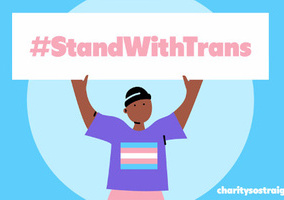Last Sunday was Trans Day of Visibility, a day intended to raise awareness of the experiences of transgender people and their families. Many charity leaders want to speak out to support trans people. Others are committed to building inclusive cultures for their colleagues or prospective employees who happen to be trans. But there is an increasing nervousness about getting it wrong, or facing backlash.
I founded Heard, a charity that is changing narratives and improving understanding of misrepresented social issues. One of our programmes, All About Trans, creates opportunities for open, honest conversations between media professionals and trans people from all walks of life. This leads to nuanced, accurate portrayals of the reality of trans experiences, away from the often-polarising discourse on social media and in the news.
Most of the trans people in our network feel what is really needed is less coverage of trans experiences, not more – so, for them, Trans Day of Visibility is greeted with a degree of ambivalence.
Changing public attitudes
When All About Trans was established in 2011, it felt like a time of huge possibility. Doors were opening, people were curious, trans people and their families could for the first time recognise themselves and their experiences across popular culture.
In 2016, I appeared on Woman’s Hour alongside Paris Lees, one of our All About Trans network members, to talk about the huge progress that had been made. There was still a long way to go, but it felt, in general, that we were heading in the right direction.
But then, alongside the increasing representation of trans people on our screens, we started to see a disproportionate increase in negative media. Government proposals to make it easier for transgender people to amend their birth certificates (the Gender Recognition Act) instigated a backlash that none of us expected. And today, despite making up between 0.5 and 1% of the population, it’s rare for a week to go by without negative stories about trans people in mainstream media.
This sustained negative coverage has had an enormous impact on transgender people and their families. Public attitudes towards trans people have become more hostile in just a few short years – as demonstrated by the most recent British Social Attitudes Survey – while transphobic hate crime quadrupled between 2015 and 2020.
Impact on the sector
When it comes to our work, the coverage has had a chilling effect. It puts huge pressure on those in our network willing to speak publicly about their experiences- with many of those who do media work facing a barrage of hate speech and even death threats. From conversations with organisations across the sector, we know that many are struggling to secure funding for narrative change work in this space, and we wonder how much this is due to the skewed representation of trans people we see across our media.
The coverage has also impacted other charities working to support trans people and those who might usually consider standing in allyship with marginalised communities. I am regularly approached by colleagues in the sector who want to speak out but feel that they can’t. Experiences such as those of GirlGuiding, whose work to support trans members was met with accusations of “wokery”, acts as a deterrent to many charity leaders who want to express more vocal support for trans people or make their work more inclusive.
We’ve become bogged down in political point-scoring and divisive culture-war rhetoric rather than holding conversations that move our understanding forward or further the rights of a minoritised group.
So how do we move forward? In short, we need resources and bravery. Organisations supporting trans people require robust funding to continue their vital work. Funders play a crucial role in deepening their understanding of trans experiences and providing long-term support for the change that’s so desperately needed. But courage isn’t just about funding – it’s about speaking out for what truly matters.
We, as a sector, must rigorously champion the fundamental right of all people to live safely and peacefully. In practice, that looks like paying more attention to, and acting on, what transgender people and their families need, highlighting the real, lived experience of trans people in the UK and standing in steadfast allyship with trans people. This will be more important than ever in the run-up to this year’s election, an election in which we know trans people will be used to further stoke a culture war.
Charities can play a crucial role in modelling constructive public dialogue and inviting people into the conversation, as we saw in the marriage equality referendum in Ireland. The backlash to trans rights we’ve seen in recent years, although extreme, has the same hallmarks of skewed representation of all the groups we work with, whether that be around migration or people experiencing poverty. This moment isn’t just about trans rights, it’s about fostering better public discourse for everyone.
Related Articles












